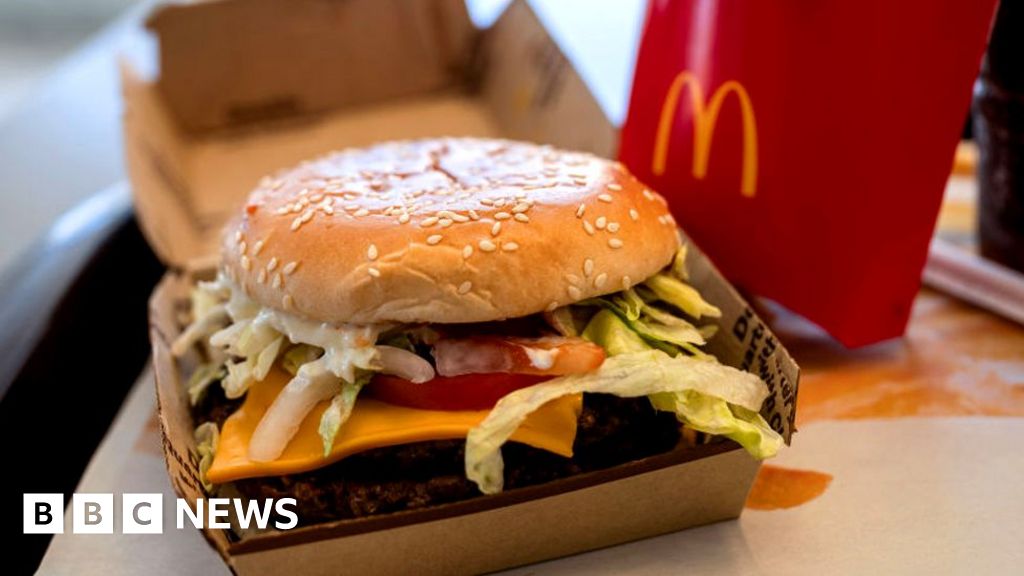Uncle Baby Billy
All Star

What we know about the McDonald's E. coli outbreak in the US
Health officials say the number of people infected after eating McDonald's Quarter Pounders has risen to 75 across 13 states.
At least 75 people across 13 states have been infected after eating McDonald's Quarter Pounders linked to a deadly E. coli strain, health authorities announced on Friday.
The Centers for Disease Control and Prevention (CDC) said 22 people have been admitted to hospital, and one person has died.
Most of the cases of E. coli, a type of bacteria that can cause serious stomach problems, were recorded in western and Midwest states.
Officials said the outbreak had prompted McDonald's and other major food companies to temporarily remove onions from their offerings, and the risk to the public "is very low".
Here's what we know so far.
How large is the outbreak?
More illness has been reported since the CDC announced on Tuesday that it was tracking an outbreak of 49 E. coli cases, concentrated in the states of Colorado and Nebraska.As of Friday, the agency had recorded 75 cases across 13 states.
Of the 26 people who became sick in Colorado, one older adult has died - the first, and only, death that has been linked to the outbreak.
The CDC said that an infected child is in hospital with a condition known as haemolytic uremic syndrome (HUS), which can cause kidney failure.
The first confirmed case was reported on 27 September, but McDonald's said authorities only notified the company of their concerns late last week. The most recent was on 10 October.
The CDC said all of the people it had interviewed so far had reported eating at McDonald's before becoming ill.
What is the source of the outbreak?
McDonald's responded earlier this week by temporarily removing Quarter Pounders and fresh slivered onions from about a fifth of its stores in the US.Investigators are eyeing the possibility that the onions, a popular topping, could be the cause of contamination.
The CDC and FDA said on Tuesday that they had not yet ruled out that the patties themselves could be to blame.
The chain has agreed with that assessment, but also said that its burgers are cooked to 175 degrees - which is above the 160 degree level needed to kill the E. coli bacteria
The cases involve purchases from multiple stores, making it unlikely that food preparation is at fault, McDonald's said.
The company said the stores involved had also used multiple suppliers for the beef patties, but shared a single supplier of onions - identified as California-based Taylor Farms, one of the world's largest vegetable processors.
Taylor Farms, which works with major food suppliers such as US Foods, has issued its own recall of some batches of onions out of an abundance of caution.
Taylor Farms said in a statement provided to the BBC's US news partner, CBS News, that it conducted tests on "raw and finished" onion products and "found no traces of E. coli".
The CDC said on Friday that due to the product actions taken by McDonald's and Taylor Farms it believed "the risk to the public is very low".
Which restaurants are affected and where?
The chain's decision to remove quarter pounders and slivered onions from the menu affects stores in Colorado, Kansas, Utah, Wyoming, as well as parts of Idaho, Iowa, Missouri, Montana, Nebraska, Nevada, New Mexico, and Oklahoma.
Other hamburger items are not affected.
On Thursday, the fast food firm Yum! Brands said it was monitoring the outbreak and had decided to proactively remove fresh onions from "select Taco Bell, Pizza Hut and KFC restaurants" in the US.
The company declined to say how many locations were affected by the decision.
Burger King said on Thursday that about 5% of its restaurants receive onions from Taylor Farms. While there has been no indication of contamination or illness at those restaurants, the chain said they had disposed of the produce and were restocking.
US Foods, a major supplier, has also alerted its customers, which include smaller regional chains.
What is E. coli poisoning and what are the symptoms?
E. coli are a diverse group of bacteria that normally live in the intestines of humans and animals.Although many are harmless, some produce toxins that can make humans very ill.
Symptoms include severe and sometimes bloody diarrhoea, stomach cramps, vomiting and fever.
Some infections can lead to other more serious problems, including kidney failure.
Symptoms tend to emerge three to nine days after eating the contaminated food.
What is the effect on McDonald's?
McDonald's shares opened down 7% on Wednesday, after news of the outbreak became public. They have since recovered some ground.The burger giant said this week that it was too early to say how damaging it would be for sales.
It said that it believed it had removed the problem from its supply chain and is aiming to return quarter pounders to the affected states in the next few weeks.
But the issue came as McDonalds was already on the defensive, as customers have cut back on fast food spending.
The change in consumer spending has forced McDonalds and other chains to lean heavily on discounts and other promotions.
The first lawsuit
The first lawsuit against McDonald's over the outbreak has been filed by a man who fell ill two days after eating at a restaurant in Greeley, Colorado.After seeking emergency care, Eric Stelly tested positive for E. coli and health officials confirmed his infection was linked to the outbreak, according to a press release from his lawyer, Ron Simon.
"We will make sure that all of the victims are fully compensated for their losses... and that McDonald's and its suppliers permanently fix the health violations that caused the food to become contaminated with E. coli.," said Mr Simon.
The lawsuit was filed in Chicago, where the headquarters of the fast-food chain is located.
